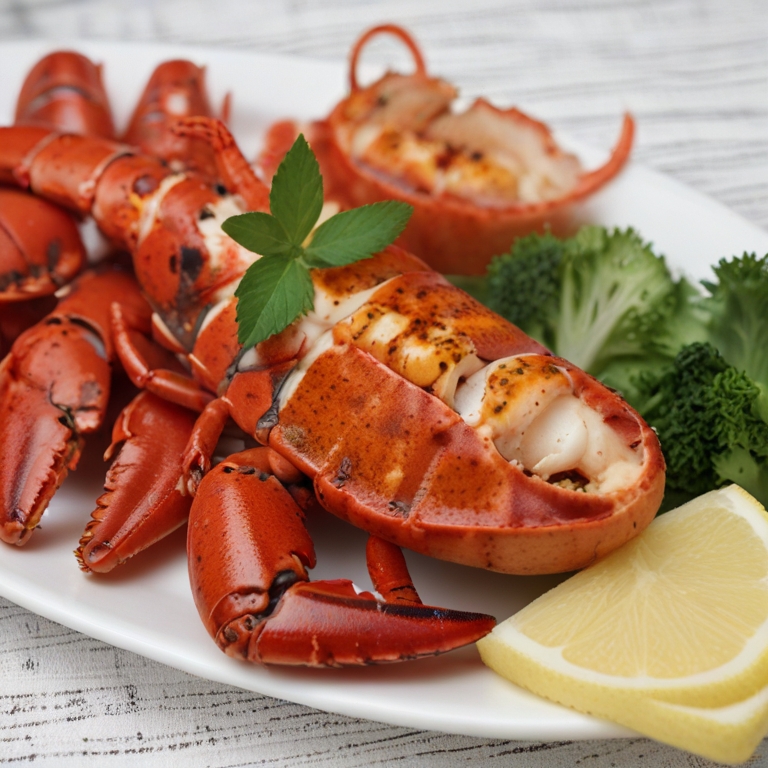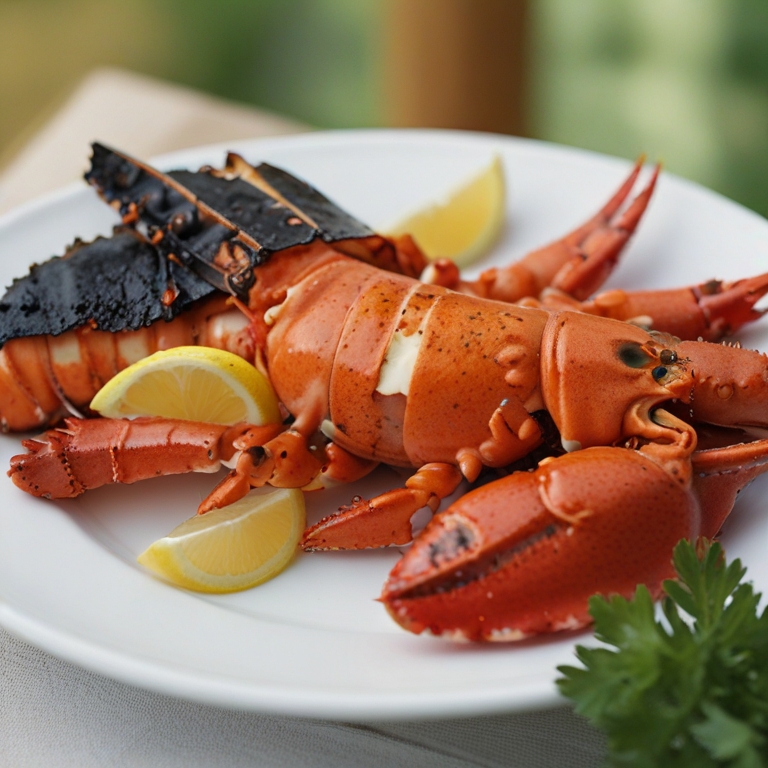Grilled lobster is a delicious and elegant dish that showcases the natural flavors of fresh lobster combined with a simple buttery garlic sauce. It's a popular choice for seafood lovers looking for a flavorful and easy-to-make dish that can be enjoyed on various occasions.
The concept of grilling lobster has roots in traditional coastal cooking, where seafood is often prepared over open flames for a smoky and distinctive flavor. Grilling enhances the sweetness of lobster meat while adding a delightful charred aroma. Over time, this method has become a classic way to enjoy lobster, especially during summer gatherings and seafood festivals. The buttery garlic sauce complements the lobster perfectly, creating a harmonious blend of flavors that has stood the test of time in culinary traditions.
Ingredients:
- 2 fresh lobsters
- 1/2 cup melted butter
- 2 cloves garlic, minced
- Salt and black pepper to taste
- Fresh lemon wedges for serving

Instructions:
1. Preheat your grill to medium-high heat.
2. Split the lobsters in half lengthwise using a sharp knife.
3. In a bowl, mix the melted butter, minced garlic, salt, and black pepper.
4. Brush the lobster flesh with the butter mixture.
5. Place the lobsters on the grill, flesh side down.
6. Grill for about 5-7 minutes until the flesh is opaque and slightly charred.
7. Flip the lobsters and grill for another 5 minutes until fully cooked.
8. Serve the grilled lobster with fresh lemon wedges on the side.
Enjoy your delicious grilled lobster!
Nutrition Value:
1. 2 fresh lobsters:
- Calories: Approximately 150 calories per 100 grams (varies based on size)
- Carbohydrates: Negligible (less than 1 gram per 100 grams)
- Protein: Approximately 27 grams per 100 grams
- Fat: Approximately 1.5 grams per 100 grams
- Sodium: Varies based on preparation, generally low (less than 100 milligrams per 100 grams)
- Cholesterol: Approximately 72 milligrams per 100 grams
- Vitamins: Rich in Vitamin B12, Vitamin E, and small amounts of Vitamin A, Vitamin D, and Vitamin K
- Minerals: Contains good amounts of phosphorus, selenium, zinc, and small amounts of calcium, magnesium, and potassium
- Nutritional Benefit: Lobster is low in calories and carbohydrates but high in protein and essential nutrients like Vitamin B12, selenium, and phosphorus, supporting overall health and well-being.
2. 1/2 cup melted butter:
- Calories: Approximately 800 calories per 1/2 cup (unsalted butter)
- Carbohydrates: Negligible (less than 1 gram per 1/2 cup)
- Protein: Negligible (less than 1 gram per 1/2 cup)
- Fat: Approximately 92 grams per 1/2 cup
- Sodium: Approximately 30 milligrams per 1/2 cup
- Cholesterol: Approximately 240 milligrams per 1/2 cup
- Vitamins: Contains small amounts of Vitamin A, Vitamin D, and Vitamin E
- Minerals: Negligible amounts of minerals
- Nutritional Benefit: Butter provides a rich, creamy flavor to the dish and adds a source of fat-soluble vitamins like Vitamin A, D, and E, although it is high in calories and saturated fats.
3. 2 cloves garlic, minced:
- Calories: Approximately 4 calories per clove
- Carbohydrates: Approximately 1 gram per clove
- Protein: Negligible (less than 1 gram per clove)
- Fat: Negligible (less than 1 gram per clove)
- Sodium: Negligible (less than 1 milligram per clove)
- Cholesterol: Negligible (zero cholesterol)
- Vitamins: Contains good amounts of Vitamin C, Vitamin B6, and small amounts of Vitamin B1, Vitamin B2, and Vitamin A
- Minerals: Contains small amounts of calcium, iron, magnesium, phosphorus, potassium, and zinc
- Nutritional Benefit: Garlic is low in calories and provides various vitamins and minerals, particularly Vitamin C and Vitamin B6, known for their antioxidant and immune-boosting properties.
4. Salt and black pepper to taste:
- Calories: Negligible (zero calories)
- Carbohydrates: Negligible (zero carbohydrates)
- Protein: Negligible (zero protein)
- Fat: Negligible (zero fat)
- Sodium: Varies based on the amount used
- Cholesterol: Negligible (zero cholesterol)
- Vitamins: Negligible (zero vitamins)
- Minerals: Negligible (zero minerals)
- Nutritional Benefit: Salt and black pepper are used for flavoring and seasoning and do not contribute significantly to calorie or nutrient intake.
5. Fresh lemon wedges for serving:
- Calories: Approximately 2 calories per wedge (varies based on size)
- Carbohydrates: Approximately 1 gram per wedge
- Protein: Negligible (less than 1 gram per wedge)
- Fat: Negligible (less than 1 gram per wedge)
- Sodium: Negligible (less than 1 milligram per wedge)
- Cholesterol: Negligible (zero cholesterol)
- Vitamins: Rich in Vitamin C, small amounts of Vitamin B6, Vitamin A, and Vitamin E
- Minerals: Contains small amounts of potassium, calcium, and magnesium
- Nutritional Benefit: Lemon wedges add a refreshing citrus flavor and provide Vitamin C, known for its antioxidant properties and immune system support.
These nutritional values are approximate and can vary based on specific ingredients and preparation methods.


Comments